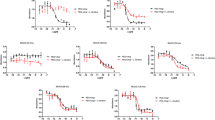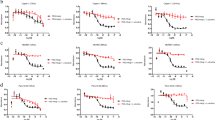Abstract
In this study, we attempt to target Arginine auxotrophy in glioblastoma multiforme (GBM) cells using a pegylated recombinant human Arginase I cobalt [HuArgI (Co)-PEG5000]. We tested and characterized the activity of HuArgI (Co)-PEG5000 on a panel of 9 GBM cell lines and on human fetal glial cells (SVG-p12). HuArgI (Co)-PEG5000 was cytotoxic to all GBM cells tested. SVG-p12 cells were not sensitive demonstrating the selective cytotoxicity of HuArgI (Co)-PEG5000-induced arginine deprivation. Addition of l-citrulline led to the rescue of 6 GBM cell lines but only at concentrations of 11.4 mM, reflecting the extent of arginine auxotrophy in GBM. The ability of l-citrulline to rescue cells was dependent on the expression of argininosuccinate synthetase-1 (ASS1) with the cells that were not rescued by l-citrulline being negative for ASS1 expression. Knocking-down ASS1 reversed the ability of l-citrulline to rescue GBM cells, further illustrating the dependence of arginine auxotrophy on ASS1 expression. Inhibition of autophagy increased cell sensitivity to HuArgI (Co)-PEG5000 indicating that, following arginine deprivation, autophagy plays a protective role in GBM cells. Analysis of the type of cell death revealed a lack of AnnexinV staining and caspase activation in HuArgI (Co)-PEG5000-treated cells, indicating that arginine deprivation induces caspase-independent, non-apoptotic cell death in GBM. We have shown that GBM cells are auxotrophic for arginine and can be selectively targeted using HuArgI (Co)-PEG5000-induced arginine depletion, thus demonstrating that l-Arginine deprivation is a potent and selective potential treatment for GBM.





Similar content being viewed by others
References
American Cancer Society (2012) Cancer facts and figures 2012. American Cancer Society, Atlanta
Preusser M, de Ribaupierre S, Wohrer A, Erridge SC, Hegi M, Weller M, Stupp R (2011) Current concepts and management of glioblastoma. Ann Neurol 70:9–21
Stone EM, Glazer ES, Chantranupong L, Cherukuri P, Breece RM, Tierney DL, Curley SA, Iverson BL, Georgiou G (2010) Replacing Mn2+ with Co2+ in human arginase I enhances cytotoxicity towards l-arginine auxotrophic cancer cell line. ACS Chem Biol 5:333–342
Morris SM Jr (2004) Enzymes of arginine metabolism. J Nutr 134:2743S–2747S
Kuo MT, Savaraj N, Feun LG (2010) Targeted cellular metabolism for cancer chemotherapy with recombinant arginine-degrading enzymes. Oncotarget 1:246–251
Muller HJ, Boos J (1998) Use of l-asparaginase in childhood ALL. Crit Rev Oncol Hematol 28:97–113
Ascierto PA, Scala S, Castello G, Daponte A, Simeone E, Ottaiano A et al (2005) Pegylated arginine deiminase treatment of patients with metastatic melanoma: results from phase I and II studies. J Clin Oncol 23:7660–7668
Cheng PN, Lam TL, Lam WM, Tsui SM, Cheng AW, Lo WH, Leumg YC (2007) Pegylated recombinant human arginase (rhArg-peg 5,000 mw) inhibits the in vitro and in vivo proliferation of human hepatocellular carcinoma through arginine depletion. Cancer Res 67:309–317
Hernandez CP, Morrow K, Lopez-Barcons LA, Zabaleta J, Sierra R, Velasco C, Cole J, Rodriguez PC (2010) Pegylated arginase I: a potential therapeutic approach in T-ALL. Blood 115:5214–5221
Izzo F, Marra P, Beneduce G, Castello G, Vallone P, De Rosa V et al (2004) Pegylated arginine deiminase treatment of patients with unresectable hepatocellular carcinoma: results from phase I/II studies. J Clin Oncol 2:1815–1822
Lam TL, Wong GK, Chong HC, Cheng PN, Choi SC, Chow TL, Kwok SY, Poon RT, Wheatley DN, Lo WH, Leung YC (2009) Recombinant human arginase inhibits proliferation of human hepatocellular carcinoma by inducing cell cycle arrest. Cancer Lett 277:91–100
Yoon CY, Shim YJ, Kim EH, Lee JH, Won NH, Kim JH, Park IS, Yoon DK, Min BH (2007) Renal cell carcinoma does not express argininosuccinate synthetase and is highly sensitive to arginine deprivation via arginine deiminase. Int J Cancer 120:897–905
Tanios R, Bekdash A, Kassab E, Stone E, Georgiou G, Frankel AE, Abi-Habib RJ (2013) Human recombinant arginase I(Co)-PEG5000 [HuArgI(Co)-PEG5000]-induced arginine depletion is selectively cytotoxic to human acute myeloid leukemia cells. Leuk Res 37(11):1565–1571
Glazer ES, Stone EM, Zhu C, Massey KL, Hamir AN, Curley SA (2012) Bioengineered human arginase I with enhanced activity and stability controls hepatocellular and pancreatic carcinoma xenografts. Transl Oncol 4:138–146
Cheng PN, Wheatley DN (2008) Arginine deprivation addresses the Achilles Heel of Cancer: urea cycle deficiencies in melanoma, HCC and other cancers. Oncol News 2:6–8
Davis F (1978) Enzyme polyethylene glycol adducts: modified enzymes with unique properties. Enzyme Eng 4:169–173
Harris JM, Chess RB (2003) Effect of pegylation on pharmaceuticals. Nat Rev Drug Discov 2:214–221
Mauldin JP, Zeinali I, Kleypas K, Woo JH, Blackwood RS, Jo CH, Stone EM, Georgiou G, Frankel AE (2012) Recombinant human arginase toxicity in mice is reduced by citrulline supplementation. Transl Oncol 5:26–31
Abi-Habib RJ, Liu S, Bugge T, Leppla SH, Frankel AE (2004) A urokinase-activated recombinant diphtheria toxin targeting the granulocyte-macrophage colony-stimulating factor receptor is selectively cytotoxic to human acute myeloid leukemia blasts. Blood 104:2143–2148
Kassab E, Darwish M, Timsah Z, Liu SH, Leppla SH, Frankel AE, Abi-Habib RJ (2013) Cytotoxicity of anthrax lethal toxin to human acute myeloid leukemia cells is nonapoptotic and dependent on extracellular signal-regulated kinase 1/2 activity. Transl oncol 6:25–32
Kim RH, Coates JM, Bowles TL, McNerney GP, Sutcliffe J, Jung JU, Ghandour-Edwards R, Chuang FY, Bold RJ, Kung HJ (2009) Arginine deiminase as a novel therapy for prostate cancer induces autophagy and caspase-independent apoptosis. Cancer Res 69:700–708
Agrawal V, Woo JH, Borthakur G, Kantarjian H, Frankel AE (2013) Red blood cell-encapsulated l-asparaginase: potential therapy of patients with asparagine synthetase deficient acute myeloid leukemia. Protein Pept Lett 20:392–402
Agrawal V, Woo JH, Mauldin JP, Jo C, Stone EM, Georgiou G, Frankel AE (2012) Cytotoxicity of human recombinant arginase I (Co)-PEG5000 in the presence of supplemental l-citrulline is dependent on decreased argininosuccinate synthetase expression in human cells. Anticancer Drugs 23:51–64
Delage B, Fennell DA, Nicholson L, McNeish I, Lemoine NR, Crook T, Szlosarek PW (2010) Arginine deprivation and argininosuccinate synthetase expression in the treatment of cancer. Int J Cancer 126:2762–2772
Syed N, Langer J, Janczar K, Singh P, Lo Nigro C, Lattanzio L, Coley HM, Hatzimichael E, Bomalaski J, Szlosarek P, Awad M, O’Neil K, Roncaroli F, Crook T (2013) Epigenetic status of argininosuccinate synthetase and argininosuccinate lyase modulates autophagy and cell death in glioblastoma. Cell Death Dis 4:e458
Periyasamy-Thandavan S, Jiang M, Schoenlein P, Dong Z (2009) Autophagy: molecular machinery, regulation, and implications for renal pathophysiology. Am J Physiol Renal Physiol 297:244–256
Wang J, Wu GS (2014) Role of autophagy in cisplatin resistance in ovarian cancer cells. J Biol Chem 289(24):17163–17173
Macintosh RL, Timpson P, Thorburn J, Anderson KI, Thorburn A, Ryan KM (2012) Inhibition of autophagy impairs tumor cell invasion in an organotypic model. Cell Cycle 11:2022–2029
Acknowledgment
This work was supported in part by intramural funding from the Lebanese American University.
Conflict of interest
The authors have no conflict of interest to declare.
Author information
Authors and Affiliations
Corresponding author
Rights and permissions
About this article
Cite this article
Khoury, O., Ghazale, N., Stone, E. et al. Human recombinant arginase I (Co)-PEG5000 [HuArgI (Co)-PEG5000]-induced arginine depletion is selectively cytotoxic to human glioblastoma cells. J Neurooncol 122, 75–85 (2015). https://doi.org/10.1007/s11060-014-1698-5
Received:
Accepted:
Published:
Issue Date:
DOI: https://doi.org/10.1007/s11060-014-1698-5




